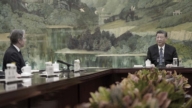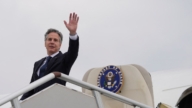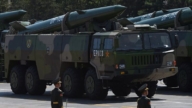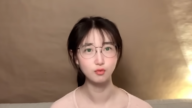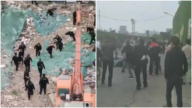【新唐人2012年10月1日訊】原《人民日報》總編輯、社長胡績偉先生最近去世。但中共當局的喉舌媒體遲了10多天才作出報導。胡績偉因在1989年「六四事件」時,反對中共以軍隊鎮壓學生被撤去公職。業界認為,當局既不願意報導他的死訊,又不敢不報,所以,斟酌考量而遲報。
胡績偉長期致力於爭取中國自由民主,被譽為「中國新聞界良心」。這個月16號上午,胡績偉在北京醫院病逝,享年96歲。而中共喉舌《新華網》推遲到27號才作出簡短報導。
《冰點》週刊主編李大同:「發還是不發,怎麼發?這官僚機構就要商量這個事,商量到最後覺得還是得發。但是只是列了個簡歷,沒有任何評價,也算是一個妥協吧。也知道他在中國新聞工作當中享有崇高的威望,不發的話也要遭罵。」
《北京之春》雜誌主編,時事評論家胡平也認為,中共當局確實不願意發出消息,但有鑒於胡績偉的社會地位和影響力,不敢不報。
《北京之春》主編胡平:「那麼要報導嘛,它就以官方口氣說話,給按個『同志』。事實上我們知道,後來,胡績偉跟現在的中共根本不是同志了。從網上看到消息,他們親人都拒絕進八寶山,不願意跟那些人埋在一塊兒,就可以看出很鮮明的一種態度。」
據了解,1981年,胡績偉在陝西臨潼撰寫文章《論黨報黨性和人民性的一致》受到批判,而在1983年9月,辭去《人民日報》社長職務。另外,出版商負責人鮑樸週五告訴《新唐人》,胡績偉的最後一部著作—-《胡趙新政啟示錄──並對「新民主主義」進行剖析》這本書,是胡70年黨員的思想總結,可以稱為中共政治改革啟示錄。書中,胡完全否定了中國共產黨。
胡績偉早年曾為《中國青年報》旗下的《冰點》週刊被停刊的事件發聲,晚年仍竭力爭取中國自由民主。
資深記者、《冰點》週刊主編李大同向《新唐人》表示,胡績偉是中國老一代新聞工作者中最先覺醒的人之一。他這一代的新聞工作者,都非常崇敬胡績偉先生。
李大同:「他用自己一生的,特別是中共建政後的新聞事件指出,黨的新聞,黨性和人民性經常發生衝突的。而且,往往是黨性壓倒了人民性,導致中共執政史上的重大的失誤,造成了嚴重的災難。中國的新聞界為這種錯誤的路線搖旗吶喊,起到了極其惡劣的作用。」
胡績偉有一句評價自我的名言:「 醒時老,老時醒。」
胡平:「這話很深刻的。所以我們對於他晚年的思想,以及他這種怎麼樣擺脫、克服共產黨專制主義思想心路過程,以及在這個過程中,怎麼樣追求真理,跟道義勇氣應該給予尊重。」
資深新聞工作者,前《北京經濟學週報》副主編高瑜28號也表示,胡績偉臨終之前大聲交代,要她繼續呼籲「平反六四」,使她非常感動,她說,她一定遵照胡老的囑託。
前《北京經濟學週報》副主編高瑜:「(胡績偉)他就是要談八九民運問題,讓我們這些後輩不要放棄。這個政治改革,現在是中共面臨的必須要解決的,迫切的一個難題了。另外六四屠殺,它在這個問題上應該認罪,這是政府的行為,是極端錯誤的,所以這是兩回事兒,我會來表達的。」
胡績偉抱著民族自由的理念,參加了中國共產黨,是70多年的老黨員。高瑜認為,從抗日一直到「 建國」以來,胡追求的就是民主自由。
高瑜:「所以他屢遭打擊。中國共產黨一直是要洗腦、要對黨員進行教育,用《延安文藝座談會講話》來改造黨員的思想。但是最後,胡老在政治理念上,和這個黨分道揚鑣,這正說明共產黨對黨員的洗腦、教育都是失敗的!」
顯然,中共當局之所以遲遲不敢報導胡績偉去世的消息,而最終只發出極其簡短的消息,不是沒有懼怕的原因!
採訪編輯/梁欣 後製/肖顏
Beijing Postponed News Coverage on Hu Jiwei’s Death
Hu Jiwei, former president and chief editor
of the People’s Daily, recently passed away.
The Chinese Communist Party (CCP) official media
did not report this news until 11 days after Hu’s death.
Hu Jiwei was removed from his posts following his objections
to military crackdowns on students during June 4 1989.
Media professionals state that the CCP regime was unwilling
to report his death, but did not dare to ignore the news.
After consideration, authorities
had to release the news late.
Having long been dedicated to striving for democracy,
Hu Jiwei is known as “China’s conscience in the press.”
On September 16, Hu Jiwei passed away at the age of 96.
The CCP mouthpiece Xinhua News Agency
did not report the news until 11 days after.
Li Datong, Chief Editor, Freezing Point: “Whether
or not to release this news was the overriding question.
The bureaucracy discussed the question.
In the end, they found they had to report the news,
but only briefed his resume, without any appraisal.
That could be considered a compromise,
as he has a huge reputation in the press in China.
The regime knows that they would face
rebukes if they hadn’t released the news.”
Beijing Spring’s editor-in-chief Hu Ping, believes the CCP
authorities were really unwilling to report the news.
However, in view of Hu Jiwei’s social status
and influence, the regime did not dare to ignore it.
Hu Ping: “So in an official tone, it reported
the news, in which he was called a “comrade”.
In fact, we all know that Hu Jiwei was
no longer the comrade of today’s CCP.
The news on the internet said his family refused to let
his bone ashes be buried at the Babaoshan Cemetery.
They don’t want him to rest with other CCP leaders there.
You can understand their clear attitude towards the CCP.”
Reportedly, in 1981, Hu Jiwei was criticized for his article.
His report asserted that the CCP newspaper’s Party spirit
and its nature of serving the People should be consistent.
In 1983, Hu Jiwei resigned as People’s Daily’s president.
On September 28, publisher Bao Pu
told NTDTV about Hu Jiwei’s last book.
It is entitled, “Revelation on New Governance
of Hu Yaobang & Zhao Ziyang”.
Bao Pu said the book is a summary of Hu Jiwei’s thinking,
from 70 years of experience as a CCP party member.
Bao Pu viewed it as a revelation for political reform,
and Hu Jiwei completely denied the CCP in this book.
In previous years, Hu Jiwei spoke out against shutting down
of Freezing Point magazine, under the China Youth Daily.
In his later years, Hu Jiwei still endeavored
to strive for China’s freedom and democracy.
Media veteran Li Datong says that Hu Jiwei was one
of the first group of awakened press people in China.
Hu Jiwei won great reverence among press
of his generation, says Li Datong.
Li Datong: “He pointed out clashes occurring in official
news reported after the CCP came into power.
Conflict often emerged between official news’
Party spirit and its nature of serving the People.
It always ended up with the Party spirit overpowering.
This led to the CCP’s major mistakes in its reign,
which further caused serious disasters in China.
China』s media has drummed up support
for this wrong policy, and that’s a really bad role.”
Hu Jiwei has a self-assessment remark:
“Getting old when being awake, awakening when getting old.”
Hu Ping: “It is a profound saying.
So we should show respect for his thought of his later years.
For his effort to get rid of the CCP’s thought control,
and for his pursuit of truth and for his moral courage.”
Veteran journalist Gao Yu reveals that Hu Jiwei,
on his deathbed, left words to her.
That is, to not stop calling for justice
for the June 4 student protest.
Gao Yu was very touched and that
she would follow his last wish.
Gao Yu: “He aimed to warn younger generations
not to give up on the June 4 pro-democracy events.
Political reform is now a hard nut
for the CCP to crack urgently.
The CCP should plead guilty for the June 4 massacre.
It was the regime’s action, and was utterly wrong.”
Holding an ideal of striving for national freedom,
Hu Jiwei joined the CCP 70 years ago.
Gao Yu thinks that Hu Jiwei has been dedicated to pursuing
democracy and freedom, ever since the Sino-Japanese War.
Gao Yu: “So that was why he was repeatedly
subjected to blows from inside the CCP.
All the time, the CCP has brainwashed
its party members to remold their thought.
But in the end, Hu Jiwei politically broke away with the CCP.
This indicates that the CCP has failed in its brainwashing.”
Obviously, behind the delay and brief news
coverage of Hu Jiwei’s death, there is fear.


